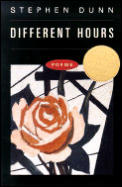 Finding the remarkable in the ordinary is a challenge many writers have taken up. The idea that what you choose to focus on in the mundane world, and how you choose to describe it, really describes the author’s inner landscape–is nothing new. It dates back to ancient Chinese nature poets, and probably further. Stephen Dunn focuses intently on the disparity between the inner and outer world time and again in Different Hours.
Finding the remarkable in the ordinary is a challenge many writers have taken up. The idea that what you choose to focus on in the mundane world, and how you choose to describe it, really describes the author’s inner landscape–is nothing new. It dates back to ancient Chinese nature poets, and probably further. Stephen Dunn focuses intently on the disparity between the inner and outer world time and again in Different Hours.
Dunn expresses a complex relationship to confession, grief and numbness in “Burying The Cat”:
For years I have known that to confess
is to say what one doesn’t feel. I hereby
confess I was not angry with that dog,
a shepherd, who had seen something foreign
on his property. I’d like to say I was feeling
a sadness so numb that I was a machine myself,
with bad cogs and faulty wiring. But
I’m telling this three years after the fact.
Nothing is quite what it was
after we’ve formed a clear picture of it.
He takes deliberately unconventional turns here, away from the voluminous body of emotive poems about an author’s dead cat–toward the numbness three years later. In doing so, however, he sweeps up all the language of sadness before denouncing it, giving the poem, like grief itself, a trajectory and progression.
Time and again, the existential void makes appearance in his poems, expressing, like the epigraph to “At The Restaurant”, Fernando Pessoa’s belief that, “Life would be unbearable / if we made ourselves conscious of it.” Indeed, it is Dunn’s keen conscious awareness of the little ironies and tragedies of life, like the habits of “The Metaphysicians of South Jersey:” praising a well-pitched game of baseball, seeking “the approximate weight of sadness,” coming home too exhausted to let their wives ask “any hard questions,” and listing “the many small things / they’d observed and thought, unable to stop talking / about this place and what a world it is.”
Dunn seems to strive for observation and careful rendering above any sort of intellectual understanding or didacticism. What else, really, can we strive for in a world that refuses to make sense? Poetry, like life, is designed to be experienced rather than understood. In a sense, this seems to be Dunn’s own replacement for religion–a Church Of Small Observations, both inward and outward.
These poems are careful, spare, consummate meditations on sadness in the modern, mundane world. They encompass unique details without getting bogged down. They pose philosophical questions without getting lofty. Above all, they reflect the inner landscape of a rough, complex and sensitive man in conflict with a strange, beautiful and brutal world–and therefore also (per Faulkner) “the human heart in conflict with itself.”